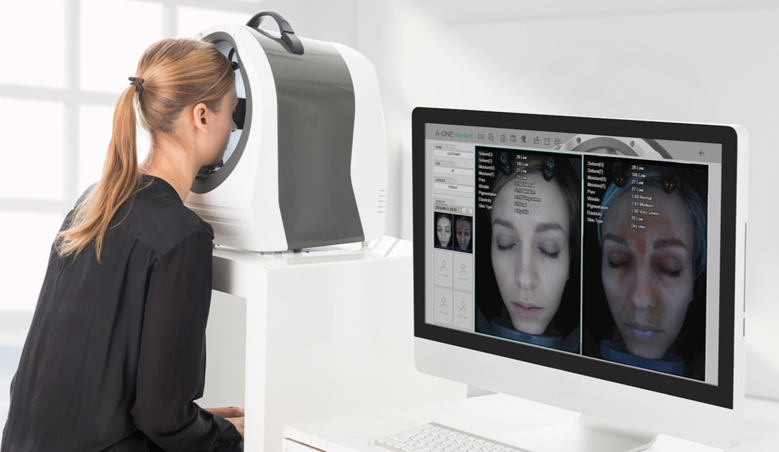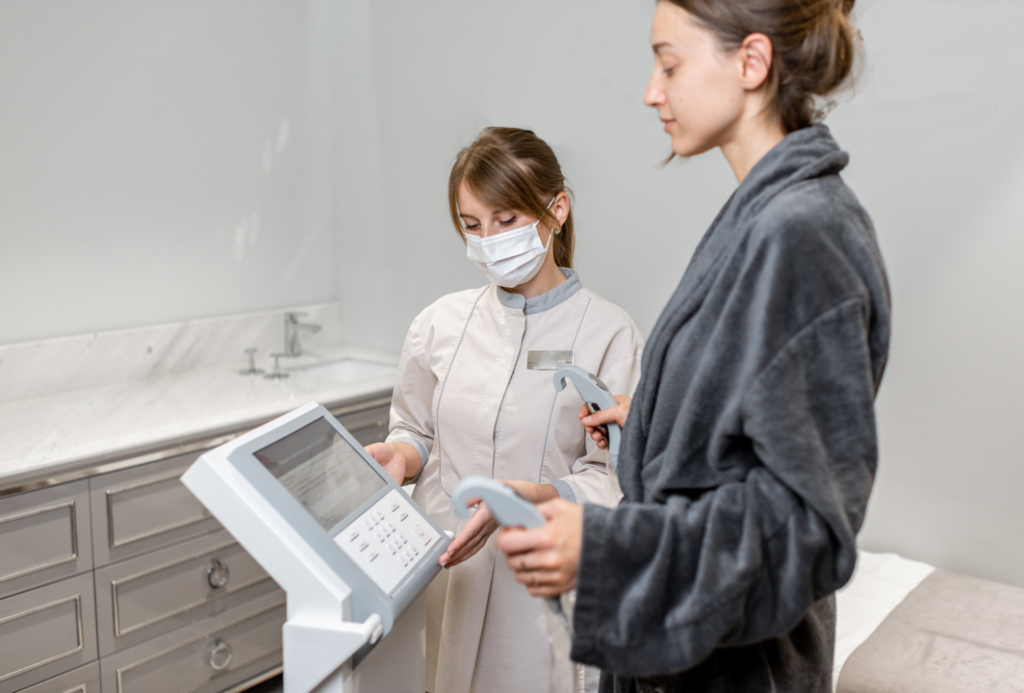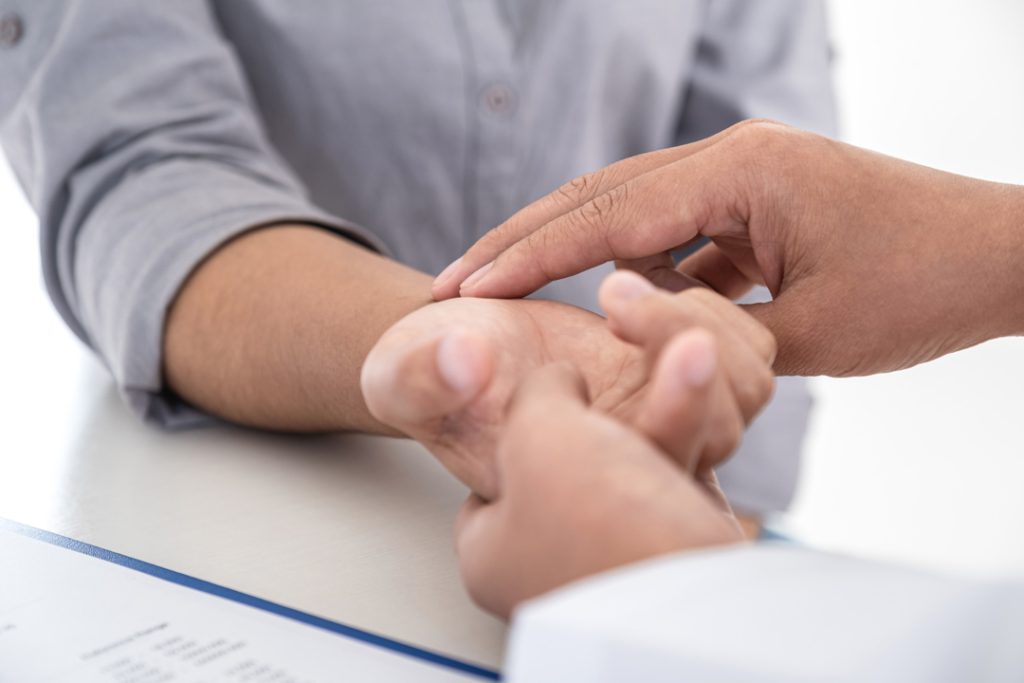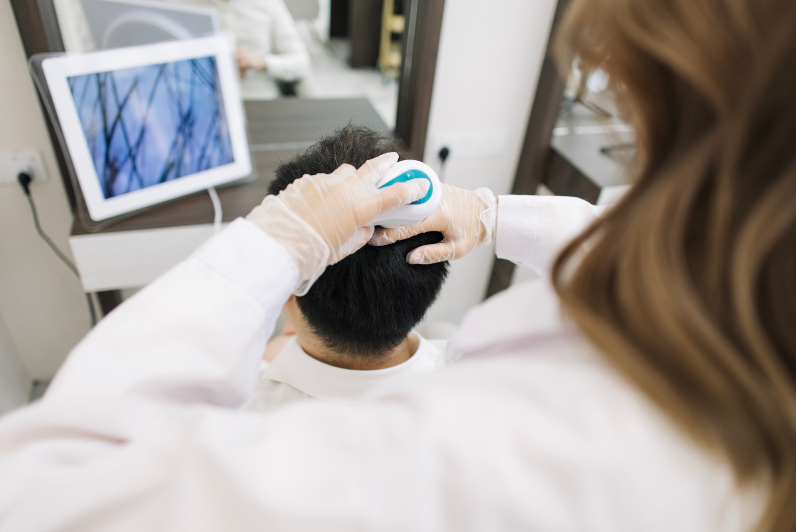When a patient first visits our clinic, we prioritize a comprehensive assessment of their health status. We begin by examining the pulse and tongue, utilizing these traditional diagnostic methods to gain insights into the patient’s condition.
Following this initial assessment, we employ advanced technology such as the InBody analyzer to evaluate the body’s balance and composition. This helps us understand the patient’s overall physical health and identify areas that may require attention.
Lastly, we emphasize the importance of diet in maintaining overall well-being. Through a thorough examination of the patient’s dietary habits and nutritional needs, we tailor personalized diet plans to support their health goals.
By combining traditional diagnostic techniques with modern technology and nutritional expertise, we strive to provide holistic care that addresses the diverse needs of our patients, promoting optimal health and vitality.

Skin Analyzer
The efficacy of a skin diagnostic device lies in its ability to evaluate and analyze the condition of the skin. Utilizing various technologies, these devices assess factors such as hydration, oiliness, elasticity, pigmentation, and wrinkles. Skin experts use this diagnostic information to recommend suitable skincare products or treatment methods tailored to individual skin conditions. This process aids in improving skin quality and maintaining overall skin health.
Inbody
The efficacy of an in-body analyzer lies in its capability to assess various aspects of body composition and health. Through the analysis of parameters such as body fat percentage, muscle mass, water content, metabolic rate, and visceral fat level, in-body analyzers provide valuable insights into an individual’s overall health and fitness. This information enables personalized recommendations for diet, exercise, and lifestyle adjustments to promote optimal health and well-being.


Pulse and Tongue Diagnosis
“Pulse diagnosis” refers to the traditional medical practice of assessing a patient’s health by analyzing their pulse. Practitioners in traditional Chinese medicine, Ayurveda, and other holistic healing systems use pulse diagnosis to gather information about the patient’s overall health, organ function, and energy balance.
“Tongue diagnosis” is another traditional diagnostic technique used in various forms of alternative and complementary medicine. Practitioners examine the color, coating, moisture level, and other characteristics of the tongue to gain insights into the patient’s health status, including digestive health, circulation, and systemic imbalances.
Both pulse diagnosis and tongue diagnosis are integral components of holistic healing systems and are used alongside other diagnostic methods to create personalized treatment plans for patients.
Body constitution
Body constitution refers to a concept in traditional Chinese medicine that categorizes individuals into different body types or constitutions based on their physical, physiological, and even psychological characteristics. These constitutions are believed to be determined by factors such as genetics, lifestyle, environment, and even emotional states.
In traditional Chinese medicine, understanding one’s body constitution is arguably one of the most important aspects. Managing the balance of yin and yang within our bodies is indeed the most crucial information for achieving a more complete balance in our bodies.
When you visit our clinic, you can learn about your body constitution and discover tailored lifestyle habits that suit it. You can learn new lifestyle consists of exercise, sleep habits and dietary concerns.


Scalp diagnosis
Scalp diagnosis is essential for determining the health of your scalp and guiding appropriate treatment and care. There are several common types of scalps, each with unique characteristics and needs. An oily scalp, for example, produces excess sebum, which can lead to a greasy appearance, dandruff, and sometimes seborrheic dermatitis. In contrast, a dry scalp lacks sufficient moisture, often causing itching, flaking, and irritation. This condition can also lead to dandruff and a feeling of tightness across the scalp.
A normal scalp maintains a healthy balance of moisture and oil, promoting overall hair and scalp health without significant issues of oiliness or dryness. Sensitive scalps, however, react more intensely to products or environmental changes, exhibiting symptoms such as redness, itching, or burning, and are more susceptible to conditions like psoriasis or eczema. Lastly, a combination scalp presents with areas of both oiliness and dryness, often with the forehead and crown appearing oily while other parts remain dry. Proper scalp diagnosis helps in choosing the right products and treatments to balance these conditions and promote scalp health.
